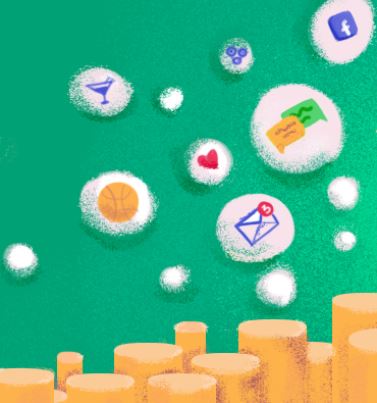Too often we lose focus on the big picture of our lives because we get lost in the weeds – our attention wanders and we come under the tyranny of small things, letting inconsequential “stuff” annoy, distract, delay, and derail us from what we really mean to accomplish.
Part of this is the result of how our brains evolved: we actually shift our focus rhythmically, up to four times every second, constantly scanning the environment to determine whether there’s something else more important (or interesting, or shiny) for us to pay attention to. Researchers at Princeton and Berkeley have found that the brain actually moves rapidly between periods of attention and distraction, suggesting that this provided an evolutionary advantage “when life was more dangerous … you would have to constantly be on the lookout, you would want to always be aware if there was something around you with bigger teeth” (see this article in Wired by Daphne LePrince-Ringuet, 8/22/2018: https://www.wired.co.uk/article/brain-distraction-procrastination-science).
Another factor is, of course, that 21st-century life offers many more distractions than the “simpler times” of, say, 20 or even 10 years ago. Mobile devices with apps that access social networks are designed to appeal to our evolutionary predilection for distraction, emails and instant messages bombard us constantly, and on-demand entertainment offered through hundreds of different channels on dozens of different devices constantly beckon us, siren-like, with momentary pleasures.
Finally, many of us live in consumerist cultures where “more is better” and we are literally distracted thousands of times every day by ads that seek to sell us the next “shiny new thing” that promises to make us happier, or thinner, or richer, or more appealing to the humans of our choice. Yankelovich, the market research firm, reported that a person living in an urban area in the United States was exposed to up to 5,000 ads every day – back in 2007! (see https://www.nytimes.com/2007/01/15/business/media/15everywhere.html). 12 years later, that number has likely more than doubled. It’s no wonder that most Americans buy more and more “stuff” they don’t need, cluttering their houses, apartments, cars, sheds, and garages with ever-growing piles of distracting objects that need storage, maintenance, and cleaning and take up valuable mental bandwidth.
How do we counter millions of years of evolution and the countless distractions of modern life, and conquer the “tyranny of small things?” Behavioral science tells us that the way to make better decisions is to put ourselves in contexts where better decisions happen almost automatically – as Dr. B.J. Fogg, Director of the Stanford Persuasive Lab, says, “there’s just one way to radically change your behavior: radically change your environment.” (see https://www.psychologytoday.com/us/blog/habits-not-hacks/201408/want-change-your-habits-change-your-environment). So, if we want to make better decisions, we need to put ourselves in environments that are conducive to making better decisions – in short, we need to engineer our environments to be less distracting, especially those environments where we want to do meaningful work.
To summarize, then:
- Our brains have evolved to be easily distracted by our environment, as a survival tool
- Our typical 21st-century environments are full of more man-made distractions than ever before, causing our easily-distracted brains to go into over-drive and preventing us from focusing on the big picture and accomplishing all those meaningful goals we’d really like to achieve in our lives
- Changing our environment will change the way we think, decide, and act – and modern behavioral science can give us tested techniques to help us make those environmental changes to remove distractions and promote focus – and freedom
Specifically, Dr. Fogg says that we can change our environment to make certain tasks harder or easier to do – if we want to avoid eating salty snacks, for example, we can alter the environment to put them on a very high shelf, out of reach, so that it takes a real effort to reach them. Conversely, if we want to go to the gym every morning, we can change our environment to put our gym clothes and sneakers right by the bed so they’re easy to get to in the morning, removing an obstacle to getting our daily exercise. Crucially, Dr. Fogg says that too many options makes it harder to focus and achieve long-term goals with consistent behavior – so, actively simplifying the environment by removing choices and creating routines can help us avoid the distractions that our brains naturally seek out.
Freeing ourselves from the tyranny of small things is not an easy task: our own nature often pulls us toward, not away from, distractions. However, we can take advantage of other features of our nature and regain our freedom by creating situations and environments that are simpler, calmer, and free of “shiny objects” that prevent us from focusing on what really matters – creating a meaningful, joyful, free life.

